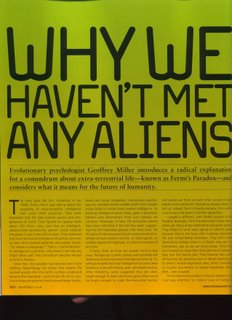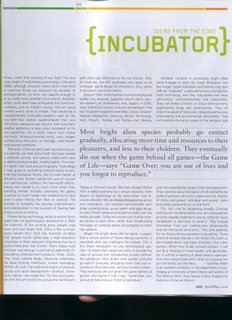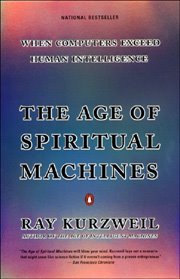I decided to post my last foray into philosophy as many of these thoughts stemmed from a discussion with Pat which took place in a small, underground gay bar in NYC called the Slide shortly after he returned from Berlin. Thought you all could provide some useful insight. Cheers.
Is it the hat and cigar or the individual?
An exercise in existentialism.
April 9, 2006
There appear to be two main ideas summarizing my thoughts over the past two months. The first idea concerns the role of content and spectacle in the actions and reactions of thoughtful minds. This idea is based upon what we can withdraw from the world, and based on what we can withdraw, what then can we add to it? The second is the idea of the individual versus society, the main question being something like: How is the individual both a product and component of society? I shall do my best to form my thoughts on both of these issues, starting with the former.
The world is full of two things: content and spectacle. Content is what fills the world. Spectacle is all which can ever be added to the world. When aimed to produce, we can do nothing more or less than expressing content in spectacle. One who experiences spectacle can have insight into the content expressed in the spectacle; can experience the content of the spectacle; or can conceptualize the spectacle and do neither. To experience pure content, we must not focus on the world. We must lose all conceptions. Only when unconceptual experience of the world is achieved will we be truly content.
Take note of this obvious duality which manifests itself even in linguistic expression. We use the word ‘content’ to express two seemingly distinct ideas. Content can be interpreted as essential meaning; or as having desires limited to what you have. Consider these synonymous: the essential meaning is to have desires limited to what you have.
In agreement with this is the fact that having desires beyond what you have is the source of all sorrow. We are never sad unless we are longing, wanting, or hoping for something. Whether it is a longing for the response from another individual, or for finding a part of yourself, your desires for things greater than what you have causes grief. We will be content when we can long for nothing we do not have. This is the essential meaning.
Even when recognized, it is an onerous task for the thoughtful mind to realize. It has been cast in the mold of a society 10,000 years in the making. Past is the most difficult enemy to content. Future is nothing more than desires created from the past. We desire only because society desires. There is no desire which is based from the individual. The true individual is content. We must strive to be individual. But if we strive to be individual, then we have had desires beyond our means, and we will never be content.
This conundrum may be the curse of the thoughtful mind. It may be a by product of the ability to conceptualize. In using concepts we lose the ability to experience without them. This is not to say we cannot have fleeting moments of unconceptual thought, because we do. When we achieve these moments, they tend to strike us furtively and leave us longing to know what we just felt. If the moment occurred during the first snow fall of the season standing on the bluffs of Montauk, we will likely to return during a similar time next year, attempting to relive the moment. This is almost certainly not met with success. It does not seem we can force unconceptual thought in this way. Though, it does appear possible to obtain this kind of thought through certain activities, including careful meditation, ‘zoning out’ on a nice day, and the use of drugs.
If unconceptualized thought were achievable on a long-term scale, it does not seem likely that we would be able to function in society. Even if we were to reject society by living alone is some forest, we would still have the conceptions which were forced upon us. We would still work to build ‘shelter’, obtain ‘water’, make ‘fire’, etc. We would desire these things. We know what they are. As hard as we try, we cannot forget these concepts or our need for them. Once an individual has been raised in society, it can no longer be free of conceptions. Conceptions are a product of society.
This may be where our essential anguish comes from. In attempting to be an individual, we must lose society. Embarking on this journey, we must lose a huge part of ourselves. We have only ever known ourselves through the conceptions of society. How can we begin to know ourselves without society? How can we even make sense of the world?
For thoughtful minds raised in a society, this is where companionship plays a central role. Because our thoughts are understood through a public language, we will never be content looking completely inward. We must look towards companionship to find ourselves. It is this point where I am most confused, and have been considering most recently. I think there is a constant struggle between companionship and identity. If you spend too much time interacting with other thoughtful minds, you will eventually lose your sense of the independent self. On the other side, if you do not spend enough time within society, you begin to lose a different—almost mysterious—part of yourself. We need other people to help us understand ourselves, because it is through other people (society) which we come to know anything. More importantly, it is societies teaching us of the past which has set the individual its present state.
From the moment we begin to learn language, we are destined to focus on the past. Our whole understanding of the world is through conceptions which come from some past set of people agreeing on how to think about something. We cannot develop our own way to think, as most other animals can. A lion cub may learn how to hunt from its elders, but it is not told how to think. It interprets the world as it chooses to. I do not think many people will object to the idea that a lion cub cannot understand that the elders were once lion cubs themselves, and they too learned to hunt from their elders.
On the other hand, we as humans have a very difficult time interpreting the world in any way other than how it was taught to us (i.e. how it was interpreted in the past). In this sense, our use of language and the formation of societies is both a blessing and a curse. In order to be blessed with all of the luxuries we enjoy everyday, we must accept the role of societies and sacrifice the ability to be content. Though, there may be so hope for content after all...
Because of the integral role society has in determining the individual, we are destined to desire something we do not have within ourselves. This is the reason friends, family, and lovers become so important in our lives. We become close with other people, in order to satiate a common desire. Some people chose objects and possessions to find companionship, others chose to leave a legacy behind, finding comfort in companionship with people across time. Still others turn to religion or a companionship with God.
There are two reasons that religion serves the thoughtful mind. The first is by providing an unconditional companion. The second is by ending the need for all worldly desires. That being said, religion will only function if one can truly be faithful. This total faith is what allows one to reject desires for that which they do not have on earth. They only desire for eternal happiness in heaven or some similar place. Because this goal is within their grasps, faithful people do not desire for something they do not have. Therefore they are content.
Even though companionship is so important, it is evident that one must retain a part of themselves which is truly individual. Our society’s obsession with secrets provides this evidence. When we have a secret, it is not only important for us to know, but it is important for other people to know we have a secret. We cannot be content simply knowing something no one else in the world knows. We must at least share the fact that we have a secret, even if we are unwilling to share the information itself. I find this observation truly insightful. It is very telling of the individual’s struggle with society, though I am not quite sure in what way precisely. I think discovering more about the nature of secrets will help reveal the roles society and the individual plays for the other. Maybe our desire to keep secrets stems from our desire to find out secrets (i.e. unlock the secrets of our universe). Then, keeping secrets would be a way to desire only what you have (i.e. to know only what you know). But there seems to be a selfish side to this idea, which I do not think is necessary…
NOTES (a.k.a. thoughts without a home):
I believe it is this reason which explains the ubiquity of religion. Religion provides the conceptual mind with a way to be content. The only requirement is faith. This is not to say that we should all pick a set of religious practices and devote our lives to them. I do not think we can manufacture faith in this manner.
Religion is useful but false. Its usefulness is evident in its ubiquity. Its falsehood is apparent in the disparity of religions around the world. No one of these religions is any more useful or true than the others.
All art is spectacle expressing content. The content is there. When we add to content, we produce spectacle. But then what of adding to spectacle? Spectacle can becomes content so long as it is experienced unconceptually.
If we could lose conceptual thought, we would not long for the companionship. Our thoughts would be pure experience. The world would not be demarcated in the ways that it is for us. We could be content.
























